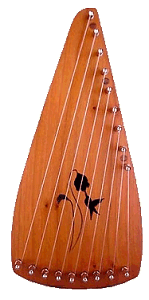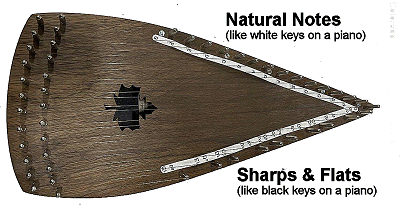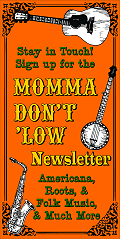|
 Bowed Psaltery Buyer's Guide Bowed Psaltery Buyer's Guide
Bowed Psalteries are triangular handheld instruments with pre-tuned strings that you play with a bow, producing surprisingly sweet tones.
Though they probably emerged around 1940. Though they hold great potential, they weren't widely known among North American traditional musicians until decades later.
Because the strings are pre-tuned for the notes you play, a well-tuned psaltery and well-rosined bow can give you a sweet sound out of every note you play.
For more information about bowed psalteries and their history, please see HarpersGuild's article "Introduction to Bowed Psaltery."
Makers By the Score - Bowed psalteries are relatively easy for anyone with woodworking skills and a drill press to build, so a good number of builders have come and gone over the years.  Some, like the one to the right, recently spotted at Tamarack, are "folksy" one-offs, built by people who specialize in home-made-looking instruments like cigar-box banjos and dulcimers. They usually sound very nice. Some, like the one to the right, recently spotted at Tamarack, are "folksy" one-offs, built by people who specialize in home-made-looking instruments like cigar-box banjos and dulcimers. They usually sound very nice.
Many "cottage industries" that built high-quality offerings similar to the four shown in the opening photo have emerged, built psalteries for a few years, then shut down, though a few are still operating.
The most prolific builders for the last several decades were Gene and Jessica Jaeger, makers of the Unicorn Strings instruments like the black one shown below. Unfortunately, they had to discontinue production about 2022, but many examples turn up on the used market. The psalteries shown at the top and bottom of the picture near the top are both Unicorn Strings products.
A few custom builders are still operating. We will list the ones we know of on this page, with the caveat that they come and go quickly.
 Diatonic Bowed Psalteries - "Diatonic" bowed psalteries can only play in one key, because they lack sharps or flats, like the Westman 9N shown at the right. There is actually a historical precedent for such instruments.
Diatonic Bowed Psalteries - "Diatonic" bowed psalteries can only play in one key, because they lack sharps or flats, like the Westman 9N shown at the right. There is actually a historical precedent for such instruments.
The bowed psaltery originated in mid-century Germany as an easy way to teach music to elementary students. You could consider it the stringed-instrument equivalent to the recorder or Flutophone many American kids learned on. Can kids still learn on such an instrument? Yes, and the bowing technique they learn will carry them forward no matter what they upgrade to.
A few diatonic psalteries have more than one octave, but a one-octave version is small enough for most children over the age of four to play. And lack of sharps and flats won't hold them back from learning many tunes. You can't start them too young, I think.
Chromatic Bowed Psalteries - "Chromatic" bowed psalteries have sharps and flats. Most often the "natural" keys (like the white keys of a piano) are arranged along the right edge of the instrument, and the sharp and flat keys (like the black keys of a piano) are arranged along the left edge. You'll see gaps there, just like there are gaps between the clusters of black keys on your piano.

 "Left-handed" Psalteries - Unlike a violin, where both hands are critical, a bowed psaltery relies chiefly on one hand, at least when you're starting out. So a version for "lefty's," like the Westman bowed psaltery on the right, makes sense. "Left-handed" Psalteries - Unlike a violin, where both hands are critical, a bowed psaltery relies chiefly on one hand, at least when you're starting out. So a version for "lefty's," like the Westman bowed psaltery on the right, makes sense.
Though you seldom find these ready-made, any builder who offers custom instruments can easily provide you with one.
Shopping
It may seem strange for a "buyer's guide" to give you tips on looking at used and "off-brand" instruments, but, aside from Unicorn Strings (now discontinued), there have been few brands that have been reliable and in business for more than a decade. So even though I point out reliable brands currently being manufactured (below), you're likely to come across other brands and "one-offs" that are worth consideration.
It seems as though at any given time, a few brands are available from major vendors and established manufacturers. But at the same time, many instruments have been built by "cottage industries," by woodworkers who dabbled, or built from kits. Building bowed psalteries isn't exactly rocket science after all. What this means is that most used bowed psalteries you will encounter will get you off to a good start, even if they're not from a known builder, or even entirely free of flaws. Just don't spend more for an off-brand or one-off than you would spend for a "name brand" instrument, even a discontinued one.
In fact, my first bowed psaltery was definitely "home-made," but it is playable to this day, and has a sweet tone because it was made with good materials.
Some folks will tell you that it's not worth "wasting time" with less than a professional-quality psaltery. The truth is, you can learn on any psaltery that is reasonably resonant and holds its tune. And as you advance in your skills and train your "ear," you'll be better equipped to choose the next one if you ever upgrade.
- Look for quality workmanship, such as all the pegs installed at the same angle, smooth joints, no cracks, etc.
- Spruce and cedar are often preferred for the face, though I've heard some nice ones made with other woods such as walnut.
- The "pin blocks," the areas where the pins go in, should be hardwood. In some cases, they're several layers of hardwoods laminated together. That may be less attractive but more solid. You may not always be able to tell what the pin blocks are made of, but don't let signs of lamination put you off.
- A quality bow is also important. Generally if you buy a bowed psaltery from a manufacturer, you'll get a bow that is comparable in quality. Most folks prefer real horsehair, and it helps if the "hair" is thick and lies flat against the strings like a violin bow for maximum friction. Length is a personal preference, though 12"-15" lengths are common.
- Accessories - You'll also need rosin, a tuning wrench, and a case or "gig bag," but you can buy those separately.
- A block of rosin is a few dollars from any music store that sells violins.
- A tuning wrench for autoharps will cost in the $10 range and will work on most bowed psalteries.
- A case or gig bag will cost you more, from $50 up as a rule, so if the psaltery you're looking at already has a good one, take that into account as you're pricing it out.
Current Builders (as of October, 2025)
Because these are not complicated for any experienced woodworker to build, many makers have come and gone. This list will grow as I find makers who are still making and shipping these.
Note: I have no commercial relationship with any of the makers below, though I have enjoyed products and good customer service from a few. Our recommendations aside, you're responsible for your own choices, and for checking out any instrument you buy while it's still in the return window for the vendor you bought it from.*
In addition, a few companies are shipping bowed psalteries that have been made in Pakistan or other middle-Eastern countries. I have no opinion on their value or playabiity, sorry.
- Song of the Wood - High-quality custom psalteries made with specially-chosen materials. Builder John Read Smith started out making hammered dulcimers, so he knows his "stuff." Only a limited number are available at any time. (I have one and it's very nice.)
- James Jones Instruments makes a variety of instruments including at least three sizes of bowed psalteries. I haven't had my hands on one, but I hear good things. (Also, their gig bags aren't bad for the price - I have a couple of those).
- Masterworks' bowed psalteries have a good reputation and look very well-made. Haven't had my hands on one yet.
- Westman Instruments make folk-style bowed psalteries in 25-string versions (2 chromatic octaves) and 9-string versions (1 diatonic octave). Their web page is a little hard to navigate but their instruments are dandy! Also, because they use 12-gauge strings instead of 10-gauge, they can make their instruments a little shorter than the average, so they might be good for people with short arms, or back-packing.
- Zither Heaven, an American builder, made a nice selection of Folk instruments, and I haven't been disappointed with their psalteries I've come across. They seem to have gone out of business as of early 2025, but some very nice psalteries are still available new through secondary marketplaces like Amazon. How long that will last, I don't know.
- James Fox, who builds custom guitars and other instruments, also makes very nice-looking bowed psalteries.
- Roosebeck instruments are made in the middle East and vary widely in quality, though I've seen some well-built examples. Right now, several are available on Amazon, including "oversized" instruments that play deeper notes than standard psalteries..
Right now there seem to be several others who make a few at a time and don't always keep their web sites updated, so it's hard to tell if they're in business or not. I'm hoping to sort more of them out in the near future.
Get On My List - If you make bowed psalteries and you're not on my list, please use our Contact page to let me know. Include a link to your web site in the comments, please.
Recent Builders
Too often, when I find a psaltery I like and would recommend, I learn that the company has just gone out of business. Obviously, you'll only find these used or as "new old stock" in niche music stores. So all the caveats of buying used apply. That said, products you may still come across in new or good conditon include.
- Unicorn Strings, an American builder, made more bowed psalteries than pretty much all the other builders put together. That said, they started building in the 1980s and went out of business about 2022, so you'll find them in all ages and conditions. They're very solid, though. I have one of their earliest ones, and it's playable in spite of obvious past abuse.
- Cabin Creek made some very nice instruments. Judging by the number of recent references to them, they may have gone out of business fairly recently. I have a little 1 1/2-octave psaltery from them. It's small, and not fancy, but it's solid and well-built, with a very sweet tone.
- Inspired Instrument made some fine examples, though they have sadly had to discontinue manufacturing.
- Orchard Springs made one in solid walnut I liked the appearance of, but have not had in my hands.
- Martin Manor went out of business some time back. I own a version with two chromatic octaves, and it has a very sweet tone.
- Dave Lucas stopped making psalteries several years ago. The one I own has a "possum board" on the back, a sort of resonator that allows the back to ring more freely. It's very well made, and sounds very nice, though the bridge is rounded, which isn't usually the best shape. I'm told Dave used to have a "saddle" on his bridges, which made the instruments louder and brighter-sounding. Seems like a person with minor woodworking skills could route a small slot on the bridge that would support a strip of fake ivory or some such.
Countless other builders have come and gone. Several have made very nice professional-quality instruments that I've only ever seen one or two of. Plus a few made by craftspersons who never sold their wares turn up once in a while.
So, I'm not listing all the ones I've seen, especially since I can't report on them.
Conclusion
Like most of the articles on our HarpersGuild and CreekDontRise pages, this article came as a result of reader inquiries, and discovering that much of the "information" on these things was either patchy or unreliable. So I've picked up a few different pieces to make certain what I was writing about them was correct and tracked down what seem to be the most reliable sources of information.
That said, if you have a correction or a question, please contact me and I'll be glad to hear from you.
Also, if you make or play bowed psalteries, and want to provide additional information, corrections, etc. we'd be glad to hear from you.
 Whatever else you get out of our pages, I hope you come away with some great ideas for "sharing the joy." Whatever else you get out of our pages, I hope you come away with some great ideas for "sharing the joy."
And please stay in touch!
- Paul Race






*Here's an irony: every year, I receive about a dozen complaints from folks who have never been to my sites before, angry that a deal between that person and a vendor or manufacturer I recommend went south (in their opinion). They "googled" the product, saw my recommendation or review, then e-mailed me to tell me they were going to sue me or report me to the Better Business Bureau for personally ripping them off by recommending a product they had bought from someone else. Ninety-nine times out of a hundred, the problem is really because the customer didn't read the whole ad, or ordered the wrong thing, or threw away his paperwork and doesn't know where he bought it from, etc. I'm always polite, and sometimes I can even help them get things straightened out with the vendor, but it's not, technically, my problem.
Click here to return to the text.
|  |




































